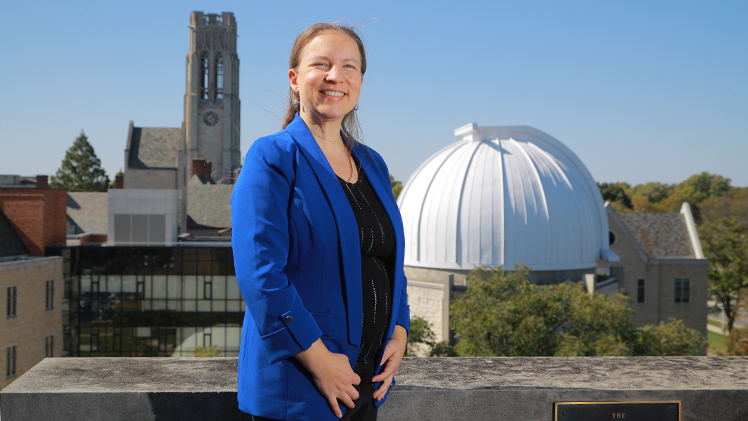Astrophysicists consider black holes to be one of the main drivers of galaxy evolution, pushing out energy that shapes them over hundreds of billions of years in a process called feedback.
In a new research project funded by the National Science Foundation (NSF), Dr. Anne Medling, an assistant professor in the Department of Physics and Astronomy, is taking a step back to explore a process that precedes feedback: How do black holes pull in fuel?

Dr. Anne Medling, an assistant professor in the Department of Physics and Astronomy, recently received a five-year, $631,159 award through the National Science Foundation’s Faculty Early Career Development (CAREER) Program.
Medling recently received a five-year, $631,159 award through the NSF’s Faculty Early Career Development (CAREER) Program. These awards are among the foundation’s most prestigious, and support early-career faculty who have the potential to serve as academic role models in research and education and to lead advances in the mission of their department or organization.
Medling’s funding covers both her research into black holes and accretion, as well as efforts toward recruitment and retention of underrepresented students to the Department of Physics and Astronomy. The latter includes plans to support student success in introductory classes, and to work with UToledo’s Office of Diversity, Equity and Inclusion and with the community education nonprofit, HOPE Toledo.
“We want to make sure students know all about how inspiring and useful physics and astronomy can be, and help them develop the skills to join us,” Medling said.
Medling has been studying the skies since childhood, when summer meteor showers ignited an early career interest at her grandparents’ home in Michigan. The New Jersey native followed that interest to the California Institute of Technology and the University of California, Santa Cruz, as well as research positions in Australia and Italy, before joining the faculty at UToledo’s Ritter Astrophysical Research Center in 2019.
Her research focus taps into an area of particular interest to astrophysicists in recent years: How do we explain how black holes impact the rest of a galaxy?
This question stems from the fact that galaxies evolve and change over time. Astrophysicists believe that one key catalyst is the supermassive black hole at the center of each one. That includes our Milky Way, with its own supermassive black hole in Sagittarius A*.
A black hole, a region in space where the gravity is so strong that not even light escapes, is a huge energy source. Medling explained that accretion is the complex process by which a black hole gains mass by pulling in the gas and dust that fuel it, and that the effects of this process extend well beyond the fraction of the galaxy that is gravitationally dominated by the black hole.
“Of course, these things happen on very long time scales,” Medling said. “We can’t just wait for it to happen and watch it, because it takes hundreds of millions of years. In astronomy, one important way we come to understand the universe is through computer simulations.”
In her NSF-funded research project, she and her research group will work closely with theorists and computer simulations of the accretion process. They’ll compare these simulations to observations of how interstellar gas and stars interact with black holes via the W.M. Keck Observatory in Hawai’i and the Atacama Large Millimeter/submillimeter Array, or ALMA, in Chile.
The objective is to gain insights into the rate of accretion under different circumstances, and to offer recommendations for galaxy evolution simulations going forward.
“This is going to help us test our understanding of how mass goes into the black hole,” she said.
This is the second major research project on which Medling is embarking in 2023. In May, Medling received a three-year, $437,057 award through National Aeronautics and Space Administration (NASA)’s D.2 Astrophysics Data Analysis program.
In this project she’s exploring the same big-picture questions about the role of black holes in galaxy evolution, but her specific objective is to track the growth of the black hole and its immediate impact on host galaxies using archival images of merging galaxies.
“Galaxy mergers are really interesting because they have all of this extra fuel,” Medling said. “If you have gas that’s just sitting around, it’s not doing very much. But if you smash two galaxies into each other, then the gas gets all sloshed up and powers this intense burst of star formation and black hole growth that can irrevocably change the galaxy.”
Medling said she’s looking forward to sharing the insights her work will yield for the NSF and NASA.
“We’re going to be juggling two very exciting things over the next few years,” she said.